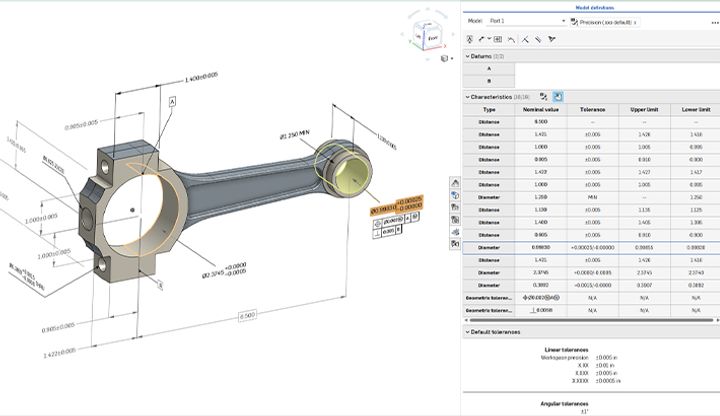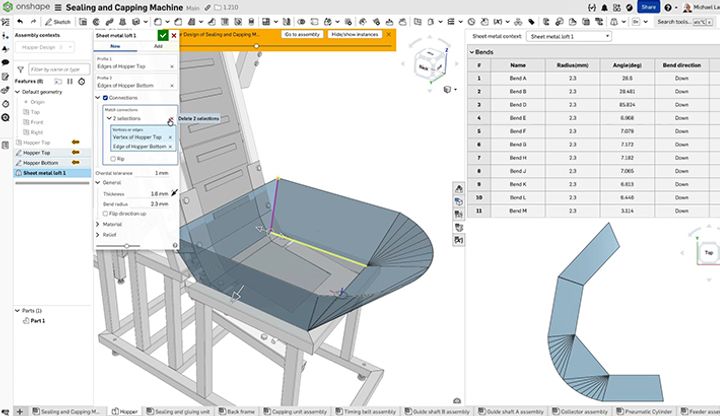
6:37
“I've said this my whole life: Engineers change the world, and the rest of us are overhead. People in the engineering discipline have an opportunity to do truly great, game-changing things with their careers, and that's the way they ought to approach it!”
– Dave Wajsgras, president of Raytheon’s Intelligence, Information and Services (IIS) business.
No matter where you went to school, what you get paid or whether you work at a startup or a multinational corporation, you – as an engineer – are uniquely positioned to impact your company’s success more than any other job role.
The folks in accounting are smart people. But they likely don’t know how your raw materials are cut or handled. You can trust your life with the people on the shop floor when it comes to manufacturing, but they probably aren’t always in the loop upstairs, where they are tracking sales and worrying about inventory.
In contrast, engineers often serve as a bridge between design, manufacturing, sales and operations. They have a broader, big-picture view of what goes on in every corner of their company – and are in a better position to identify areas for improvement and offer solutions.
But just showing up to work everyday and doing a “good job” likely isn’t enough to put you on the fast track for career advancement. Here are a few tips and pieces of advice for mechanical engineers from leading executives:
- Why Not to Worry About Your Job Title
- 3 Traits Execs Value Most in a Mechanical Engineer
- More Advice for Mechanical Engineers
Don't Worry About Job Title
(The following is an excerpt from Onshape’s career advice for mechanical engineers eBook, "3 Things Executives Value Most in a Mechanical Engineer.” John McEleney is a co-founder of Onshape, a PTC Technology.)
When engineers start talking about job titles, it always drives me crazy. I think people should be less focused on their title and more focused on what they're really doing. And I'm not saying you should sit in the engine room and be quiet.
If you're a mechanical engineer, and you want to learn more about software, then raise your hand and say, "I want to learn more about software because I realize it's a huge part of how the world's going to move forward."
You can better position yourself by working on projects that may include this component or by finding colleagues working on software and let it be known that you want to learn more. Find ways to offer your assistance. Be available nights, weekends, whatever it takes.
Let it be known that you want to take on more responsibility. When people ask you for help, the answer is yes. However, if you don’t know how to do it, be transparent. Say, “Hey, I'm not really sure, but I know I can learn.” Try and position yourself to become who you want to be.
In my view, the busy people at your company will always be busy, and they’ll only get busier. Why? Because people want to lean on people who can get stuff done. Asking how you can learn new skills is a lot more constructive than saying “I want to be the project manager” or “I need to make more money.”
On that note, don’t ever say, "I want to do this, or I'm going to leave the company." I can't stand when people give me ultimatums. Typically, I'll open the door for them to leave if they want to leave. Making threats and demands isn’t helpful. If you genuinely feel that you’re being underpaid, it's important to raise that with your manager, but not in a way that says you need to get paid more or you’re going to quit. You can’t build relationships and trust with threats.
I’ve never asked for a promotion in my life. Ask how you can expand your current role and responsibilities at your company. Keep raising your hand to learn new skills and take on new challenges. Focus on those more than your job title, and the promotions will follow.
3 Traits Execs Value Most in a Mechanical Engineer
(The following is an excerpt from Onshape’s career advice for mechanical engineers eBook, "3 Things Executives Value Most in a Mechanical Engineer.” Dave Wajsgras was the former Raytheon Company vice president and president of the Intelligence, Information, and Services (IIS) business.)
One of the most vital qualities we look for in an employee is integrity. I use this term broadly – and it goes far beyond engineering – but what I mean is don’t try to fake it.
Just because you have deep domain expertise in mechanical engineering, doesn’t mean you have the same level of expertise in electrical engineering or software engineering. Even though you might know a little bit about other areas, it’s important to be realistic with yourself and with your team about what you’re an expert at and what you are not. It doesn’t mean you can’t weigh in. It doesn’t mean you can’t have an opinion. But I think companies or organizations run into problems when they rely too much on people who are providing input that is not necessarily in their area of expertise.
I think it’s incumbent on individuals to be honest about the information or guidance that they are conveying. As long as they do that appropriately, everyone wins and you will usually arrive at the best solutions.
Integrity with your colleagues means not being afraid to ask questions. It’s not a weakness to say “I don’t know.” It’s a strength and shows an enormous amount of self-confidence. Although your experience and knowledge may have some overlap with different silos, you need to be thoughtful about how you communicate technical solutions, how you frame suggestions, and make sure you separate fact from opinion. I think that’s critically important.
Along those same lines, I also value engineers who are passionate about learning and ask genuine questions about how their piece of the puzzle fits into the broader deliverable. It’s refreshing when I hear that and it always makes those people stand out for me. Candidly, I wish I heard this all the time from younger and mid-level engineers. But frankly, I don’t hear it as often as I would like.
So at Raytheon, that would mean asking: How will this particular solution be used at the mission level? What will the Warfighter be doing with this particular capability? And when you work from the tail end backwards, you really see how your deliverable works into the bigger picture. I think this motivates people from both an effort standpoint and a quality-of-delivery standpoint.
If you’re an engineer who wants to move up into either a technical management role or a nontechnical management role, one of the best ways to do that is to understand that broader picture as early as possible. Of course, you’re still expected to deliver on your specific objectives. But making an effort to expand your knowledge base lets senior management know that you’re able to think beyond your individual role and focus on the company’s needs as a whole.
More Advice for Mechanical Engineers
In Onshape’s eBook, “3 Things Executives Value Most in a Mechanical Engineer,” we will share ways how you can start thinking on the same wavelength as your boss and get on his or her radar. The book will also offer direct and candid career advice for mechanical engineers from current or former executives at Raytheon Company, Stratasys, Understory, Onshape, and Desktop Metal.
So now that you know you have the power to change your company’s fortunes, what are you going to do about it?
P.S. Although we can’t guarantee reading this eBook will score you an instant raise, we are betting that adopting this advice for mechanical engineers will push you in the right direction.
(This blog was updated Feb. 1, 2023.)
Latest Content

- Case Study
- Robotics
Saga Robotics: Powering the Future of Sustainable Farming with Cloud-Native Onshape
01.05.2026 learn more
- Blog
- Evaluating Onshape
- Simulation
- Rendering
- Surfacing
- Consumer Products
Earlier Validation, Better Outcomes: Onshape’s Approach to Surface Design
02.20.2026 learn more
- Blog
- News from Onshape @ PTC
- Publications
- Configurations
- Data Management
Onshape MBD: Single Source of Truth from Design to Manufacturing and QA
02.23.2026 learn more
- Blog
- Becoming an Expert
- Sheet Metal
Two Views, One Model: Faster Sheet Metal Design in Onshape
02.12.2026 learn more


